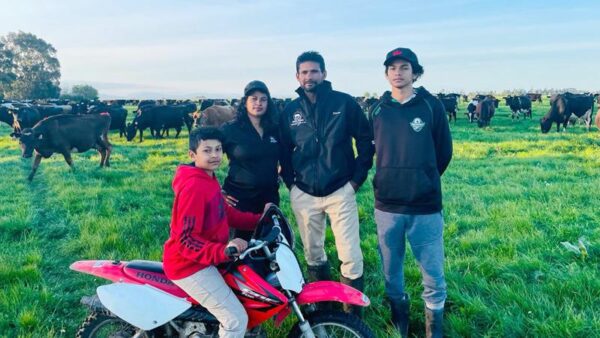
Source:Sundayobserver
Sri Lanka’s dairy industry was a contentious topic for the past few weeks due to the price controls on milk powder. Although consumers faced difficulties, it was no doubt an opportunity for local dairy farmers to step up to the challenge in meeting local demands. As the milk powder issue left a sour aftertaste in most of our tongues, miles away across the seas, Sri Lanka’s image was being positively reinforced in New Zealand’s dairy industry due to the feats of a young farming couple from Sri Lanka.
Dinuka Gamage settled in New Zealand after leaving his hometown Malwatte, Ruhunugama in Ampara in 2008. His wife Nadeeka and two children joined him in 2011. The Gamage family literally found greener pastures in the New Zealand countryside making a living out of dairy farming. Thirteen years of finding their way through the industry, and equipping themselves with better skills and knowledge finally proved worthwhile earlier this year when the New Zealand’s Canterbury/North Otago Dairy Industry Awards 2021 announced Dinuka and Nadeeka Gamage winners of their region’s Share Farmer of the Year, receiving $10,250 in prizes and two merit awards.
“As Sri Lankans, we are so proud of this achievement as there were many New Zealanders who competed,” Nadeeka said.
The Awards
 The New Zealand Dairy Industry Awards attract farmers from across the country, working in all levels of the dairy industry. Three award categories give entrants the chance to challenge themselves, earn a regional or national title and to share in substantial regional and national prize pools. Diluka and Nadeeka making a living in the grassy plains of Canterbury, South Island entered the Share Farmer of the Year category this year too. Share farmers or tenant farmers are those receiving an agreed share of the profits from the owner. In a share farming arrangement, a landowner extends land to another farmer and from there, they share the expenses and profits while still operating as separate businesses.
The New Zealand Dairy Industry Awards attract farmers from across the country, working in all levels of the dairy industry. Three award categories give entrants the chance to challenge themselves, earn a regional or national title and to share in substantial regional and national prize pools. Diluka and Nadeeka making a living in the grassy plains of Canterbury, South Island entered the Share Farmer of the Year category this year too. Share farmers or tenant farmers are those receiving an agreed share of the profits from the owner. In a share farming arrangement, a landowner extends land to another farmer and from there, they share the expenses and profits while still operating as separate businesses.
The Gamages contract milk 1,000 cows on the 245ha Dairy Holdings Ltd property in Ashburton. Their farming operation is a fully grass-based system with no outside supplements. It is largely self-contained apart from winter grazing on another Dairy Holdings block. The Gamages feed silage made on-farm to help keep the cows milking through the autumn slow-down. Since January 1 this year, they’ve been milking 16-hourly, through the farm’s 48-bail rotary shed.
“Agriculture has always been our career choice,” said Dinuka. “We love working outside with animals and nature. It was challenging at first to learn the skills required to be a New Zealand dairy farmer but we have overcome that through continuous education and experience.”
Experience
Dinuka had been working in the dairy industry even in Sri Lanka before he applied for a job in New Zealand. He was a sales promotion officer in animal health where his duty was to promote animal medicine to dairy farms in Sri Lanka. For five years, he had closely collaborated with veterinary surgeons and dairy farmers of Kurunegala, Gampaha, Anuradhapura and Polonnaruwa, which earned him a gamut of experience in animal health. His experience coupled with the agricultural engineering diploma from the Hardy Advance Technical Institute in Ampara helped him land the job in New Zealand.
Nadeeka is from Pilimatalawa, Kandy and had been a pillar of strength to Dinuka from the beginning. It had been hard in the beginning for both husband and wife as they struggled to get a foothold in the industry that New Zealand is most famous for. Dinuka found vastly different terrains in New Zealand when it came to dairy farming.
“The New Zealand dairy industry is completely different to that of Sri Lanka. Unlike in Sri Lanka, New Zealand has only four to five staff members in a farm with 1,000 cows. In Sri Lanka, dairy farms this big would have hundreds of workers. But here, the system is different. More than the advanced technology, the attitude to dairy farming here is different. Even the farm manager or farm owner would not hesitate to labour in the fields and milk the cows if staff aren’t present. They believe in time management, are efficient and committed. So, with this system in place, they could get the job done even with a handful of staff,” Dinuka said.
Improvement
Dinuka soon found out that he needed to acquire better skills and knowledge to survive in New Zealand’s dairy industry. He strove for better qualifications and completed diplomas in Agribusiness Management, and Technology from New Zealand. He achieved PrimaryITO Level 5 Production Management and Level 4 Dairy Farming and Biz Start from DairyNZ while he started off as Herd Manager attached to a dairy farm in Canterbury. Nadeeka holds the New Zealand Certificate in Early Childhood Education and started work at a preschool. However, she now commits herself fully to the farm, occasionally working as a teaching aide.
“It was a huge challenge at first when we moved here,” Dinuka said. “I started early in the morning, waking up at 4am in the freezing cold to gather 1000 cows from the grazing lands to the milking parlour. Sometimes it even snowed as I rode my bike in the pastures. The weather was the most challenging coming from the hot and humid climate of Sri Lanka. Then, there was a lot to learn about their way of doing things. But I really enjoyed the outdoors and kept improving myself,” he said.
Though he got a job in New Zealand, Dinuka didn’t stop looking for more opportunities.
He followed the New Zealand Dairy Industry Awards every year. In 2016, he got the break he was waiting for, being placed third in the Canterbury/North Otago Dairy Manager category. By this time, he upped the scale to Dairy Manager from Assistant Farm Manager and Herd Manager. From this win, Dinuka was offered many opportunities and was finally able to establish a business in New Zealand as a share farmer in 2017.
Ambitions
“I started purchasing cows and built up a herd. Now I own 400 cows and the remaining 600 is from the farm owner. Here, a cow has great value – as much as NZ $ 2,000 (nearly Rs. 300,000). I have my own staff, equipment, tractors, bikes, and so on. and use the land on loan. My business is registered in New Zealand as Luckcow Dairy Ltd. My wife and I have been running the business for five seasons. A season here starts from June 1 ending after 12 months,” Dinuka said.
He added that his ambition is to own a farm one day. This is a viable option for Dinuka and Nadeeka as they could show their assets to the bank and get the lands. The immediate goal is to continue to farm sustainably, aiming for 50/50 share milking or an equity partnership.
Being a part of New Zealand’s thriving dairy industry has not made Dinuka and Nadeeka forget their roots. They’ve been supporting and mentoring youngsters, coming from Sri Lanka to New Zealand with genuine ambitions in the dairy industry, in leadership training and skills building. Contributing to Sri Lanka’s dairy industry by imparting knowledge of best practices from New Zealand is also their dream.






